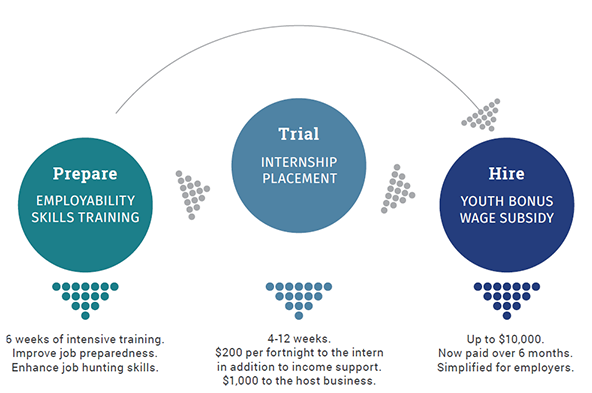Jobs and growth
Sticking to our national economic plan for jobs and growth in a stronger, new and more diversified economy
Creating a new pathway to youth employment
Helping young people through Australia’s economic transition
More than 50,000 youth jobs were created over the past 18 months. The $840 million Youth Employment Package steps this up with an enterprising new approach to youth employment, and will help up to 120,000 vulnerable young people over four years take advantage of job opportunities as the economy diversifies and transitions to broader‑based growth.
Long-term welfare dependency is not good for the economy or society. For example, if a person stays on a Newstart or Youth Allowance (Other) payment for two years, on average they will remain on a working age payment for another five to six years.
The Government’s innovative $752 million Youth Jobs PaTH (Prepare-Trial-Hire) Programme will help young job seekers to move off welfare and into employment.
Youth Jobs PaTH
Stage 1: Employability skills training
To help young people gain a foothold in the labour market, from 1 April 2017, young job seekers will participate in intensive pre-employment skills training within five months of registering with jobactive (unless extenuating circumstances exist).
The first three weeks of training will focus on skills such as working in a team, presentation, and appropriate IT skills. A further three weeks of training will centre on advanced job preparation and job hunting skills.
Youth Jobs PaTH
Stage 2: Internship placement
Up to 120,000 internship placements over four years will be provided to help young job seekers who have been in employment services for six months or more gain real work experience within businesses.
Job seekers and businesses, with the help of employment service providers, will be able to work together to design an internship placement of 4 to 12 weeks duration, during which the job seeker will work 15 to 25 hours per week. Participation in an internship placement will be voluntary for both job seekers and businesses.
In addition to gaining hands on experience in a workplace, job seekers will receive $200 per fortnight on top of their regular income support payment while participating in the internship.
Businesses that take on interns will receive an upfront payment of $1,000, and will also benefit from the opportunity to see what a young worker can do and how they fit in to the team before deciding whether to offer them ongoing employment.
Youth Jobs PaTH
Stage 3: Youth Bonus wage subsidy
Stage three of the new Youth Jobs PaTH provides increased and streamlined wage subsidies for youth.
From 1 January 2017, Australian employers will be eligible for a Youth Bonus wage subsidy if they hire a young job seeker who has been in employment services for six months or more.
The most job ready job seekers will attract a wage subsidy of $6,500. A larger $10,000 wage subsidy will be available to businesses that employ job seekers classified as less job ready by jobactive providers. Businesses will have the flexibility to employ young job seekers either directly, through labour hire arrangements, or combined with an apprenticeship or traineeship.
Real work, real jobs
Enhancing wage subsidies will benefit both job seekers and businesses
As part of these reforms, existing wage subsidies (including those for youth, parents, Indigenous, mature age, and the long term unemployed) will be streamlined, making them easier for employers to access.
Wage subsidy arrangements will be simplified and made much more flexible.
- Wage subsidies will be available to employers from day one of a job seeker's employment.
- Employers will have flexibility to choose how often instalments are paid (fortnightly, monthly, or some other arrangement) and over what time period.
- Wage subsidies will be paid out sooner over six months rather than 12 months.
- Wage subsidies will be paid more simply at a flat rate instead of pro-rated instalments.
How the changes can help young people get into real jobs
Gaining the experience of an internship

Eva is 22 years old and has been unemployed for six months. She receives Newstart Allowance and is registered with jobactive.
Eva is told about the new internship opportunities by her jobactive provider and organises a twelve week internship with her local supermarket. She not only continues receiving her Newstart Allowance, but receives an additional $200 each fortnight for the twelve weeks of her placement.
Increasing employability

Justin is 18 years old. He left school and signed up to jobactive. Justin hasn't had a job before and is uncertain about how to make the move from school into work.
With the introduction of the Youth Jobs PaTH, Justin is now eligible for employability skills training. The training increases his confidence significantly, and gives him important practical knowledge about where and how to start looking for a job.
Following the training, Justin successfully finds a job working for his local newsagent.
Helping youth, helping business

Virginia owns a café in a busy shopping centre. She has thought about taking on another waiter but is concerned about introducing an unknown person into her well-functioning team.
Virginia hears about the new internship initiative and contacts her local jobactive provider to arrange a placement. She is introduced to Miles, who is a 19 year old job seeker who has been struggling with depression and has been in jobactive looking for work for seven months. He recently completed intensive employability skills training and feels more confident and prepared for the workforce.
Virginia and Miles agree to an internship placement of 20 hours per week for eight weeks. Virginia receives a $1,000 upfront payment when the internship placement commences, and Miles receives $200 fortnightly on top of his income support.
At the end of the eight weeks, Miles has gained valuable experience in the café. Virginia has been encouraged by how Miles has grown into the job and sees he's a good fit for her team.
Virginia hires Miles in an ongoing position and receives a weekly wage subsidy of $385 per week for the first six months of Miles' employment.
Fostering innovation and self‑enterprise
Encouraging entrepreneurship and innovation goes to the core of the Government's agenda for jobs and growth
In addition to creating the Youth Jobs PaTH, the Government is investing an extra $89 million in supporting job seekers, including young people, who wish to start their own business. This complements the Government's National Innovation and Science Agenda and will help more Australians capitalise on the opportunities presented by Australia's economic transition.
Building on the success of the New Enterprise Incentive Scheme (NEIS)
From 1 December 2016, eligibility for the NEIS will be broadened to allow access to self-employment training and mentoring for job seekers who are not in employment, education or training, including those not on income support.
The Government will provide funding for an additional 2,300 NEIS places each year, making a total of 8,600 places available annually.
The NEIS will continue to provide eligible job seekers with small business accredited training, mentoring and business advice for up to 52 weeks.
Three new mechanisms to promote and support self‑employment
The Government will establish new 'Exploring Being My Own Boss' workshops to engage job seekers to explore self-employment.
To help young people to develop their innovative ideas into successful businesses, Self-Employment Starter Packs will also be introduced. These will contain information on the services available to support job seekers to establish a business.
Finally, Inclusive Entrepreneurship Facilitators will be appointed in selected locations with high youth unemployment. Facilitators will help bring together available services and programmes (such as jobactive, NEIS, microfinance services, and start-up incubators). They will also provide practical assistance including help accessing local mentors, business partners, finance, office space, equipment and ongoing business development training.



